| Listing 1 - 3 of 3 |
Sort by
|

ISBN: 9027976899 3110803801 0202020169 9783110803808 9789027976895 9780202020167 Year: 1975 Publisher: The Hague : Chicago : Mouton ; distributed in the USA and Canada by Aldine,
Abstract | Keywords | Export | Availability | Bookmark
 Loading...
Loading...Choose an application
- Reference Manager
- EndNote
- RefWorks (Direct export to RefWorks)
No detailed description available for "Primate Functional Morphology and Evolution".
Conference proceedings. --- Primates --- Human evolution --- Physiology --- Evolution --- Congresses. --- Anatomy --- Quadrumana --- Mammals

ISBN: 9027976996 0202020177 9783110810691 3110810697 9783110810691 9789027976994 9780202020174 Year: 1975 Publisher: The Hague : Chicago : Mouton ; distributed in the USA and Canada by Aldine,
Abstract | Keywords | Export | Availability | Bookmark
 Loading...
Loading...Choose an application
- Reference Manager
- EndNote
- RefWorks (Direct export to RefWorks)
No detailed description available for "Paleoanthropology".
Fossil hominids --- Primates, Fossil --- Congresses. --- Mammals, Fossil --- Paléoanthropologie --- Paléoécologie --- Paléoanthropologie --- Paléoécologie --- Paleoanthropologie
Book
ISBN: 0674727851 1785396005 0674726537 9780674726536 9781785396007 9780674073166 0674073169 Year: 2014 Publisher: Cambridge, MA : Harvard University Press,
Abstract | Keywords | Export | Availability | Bookmark
 Loading...
Loading...Choose an application
- Reference Manager
- EndNote
- RefWorks (Direct export to RefWorks)
In this masterwork, Russell H. Tuttle synthesizes a vast research literature in primate evolution and behavior to explain how apes and humans evolved in relation to one another, and why humans became a bipedal, tool-making, culture-inventing species distinct from other hominoids. Along the way, he refutes the theory that men are essentially killer apes--sophisticated but instinctively aggressive, destructive beings. Situating humans in a broad context, Tuttle musters evidence from morphology and recent fossil discoveries to reveal what early primates ate, where they slept, how they learned to walk upright, how brain and hand anatomy evolved simultaneously, and what else happened evolutionarily to cause humans to diverge from their closest relatives. Despite our genomic similarities with bonobos, chimpanzees, and gorillas, humans are unique among primates in occupying a symbolic niche of values and beliefs based on symbolically mediated cognitive processes. Although apes exhibit behaviors that strongly suggest they can think, salient elements of human culture--speech, mating proscriptions, kinship structures, and moral codes--are symbolic systems that are not manifest among apes. This encylopedic volume is both a milestone in primatological research and a critique of what is known and yet to be discovered about human and ape potential.
Primates --- Fossil hominids. --- Human evolution. --- Evolution (Biology) --- Physical anthropology --- Evolutionary psychology --- Human beings --- Early man --- Fossil hominins --- Fossil man --- Hominids, Fossil --- Hominins, Fossil --- Human fossils --- Human remains (Archaeology) --- Primates, Fossil --- Paleoanthropology --- Evolution. --- Origin --- Evolution. Phylogeny --- Mammals
| Listing 1 - 3 of 3 |
Sort by
|

 Search
Search Feedback
Feedback About UniCat
About UniCat  Help
Help News
News